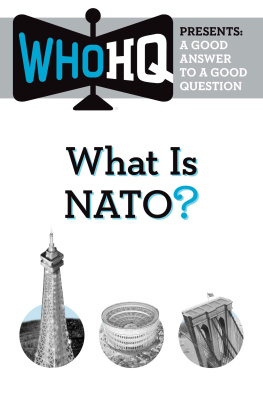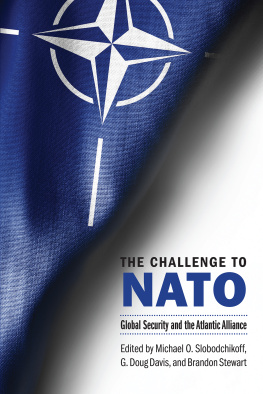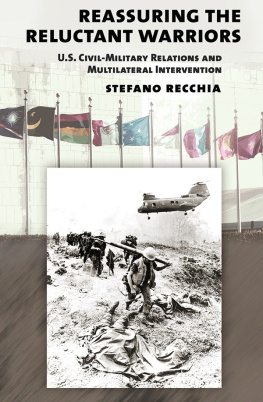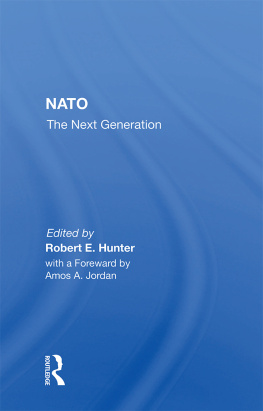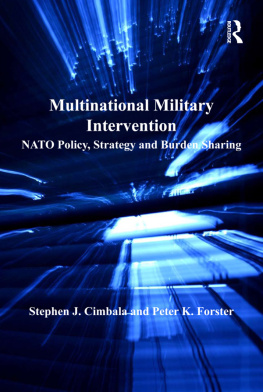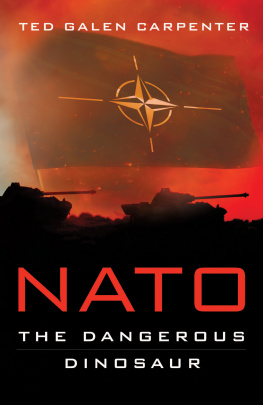ROUTLEDGE LIBRARY EDITIONS: COLD WAR SECURITY STUDIES
Volume 8
BURDEN-SHARING IN NATO
First published in 1983 by Routledge & Kegan Paul Ltd
This edition first published in 2021
by Routledge
2 Park Square, Milton Park, Abingdon, Oxon OX14 4RN
and by Routledge
52 Vanderbilt Avenue, New York, NY 10017
Routledge is an imprint of the Taylor & Francis Group, an informa business
1983 Royal Institute of International Affairs
All rights reserved. No part of this book may be reprinted or reproduced or utilised in any form or by any electronic, mechanical, or other means, now known or hereafter invented, including photocopying and recording, or in any information storage or retrieval system, without permission in writing from the publishers.
Trademark notice: Product or corporate names may be trademarks or registered trademarks, and are used only for identification and explanation without intent to infringe.
British Library Cataloguing in Publication Data
A catalogue record for this book is available from the British Library
ISBN: 978-0-367-56630-2 (Set)
ISBN: 978-1-00-312438-2 (Set) (ebk)
ISBN: 978-0-367-63011-9 (Volume 8) (hbk)
ISBN: 978-1-00-311186-3 (Volume 8) (ebk)
Publishers Note
The publisher has gone to great lengths to ensure the quality of this reprint but points out that some imperfections in the original copies may be apparent.
Disclaimer
The publisher has made every effort to trace copyright holders and would welcome correspondence from those they have been unable to trace.
Chatham House Papers 18
Burden-sharing in NATO
Simon Lunn
The Royal Institute of International Affairs is an unofficial body which promotes the scientific study of international questions and does not express opinions of its own. The opinions expressed in this paper are the responsibility of the author.
None of this paper was written while the author was employed by the North Atlantic Treaty Organization and the views expressed are purely his own.
First published 1983
by Routledge & Kegan Paul Ltd
39 Store Street, London WC1E 7DD,
9 Park Street, Boston, Mass. 02108, USA and
Broadway House, Newtown Road,
Henley-on-Thames, Oxon RG9 1EN
Printed in Great Britain by
Billing & Son Ltd, Worcester
Royal Institute of International Affairs 1983
No part of this book may be reproduced in any form without permission from the publisher, except for the quotation of brief passages in criticism.
Library of Congress Cataloging in Publication Data
Lunn, Simon.
Burden-sharing in NATO.
(Chatham House papers: 18)
Includes bibliographical references.
1. North Atlantic Treaty Organization. I. Royal
Institute of International Affairs. II. Title.
III. Title: Burden-sharing in N.A.T.O. IV. Series.
UA646.3.L83 1983 355.03l091821 83-4497
ISBN 0-7100-9233-4
Contents
2 The historical background
3 The Soviet invasion of Afghanistan
4 The alliance dilemma
5 The Reagan Administration
6 Burden-sharing
7 Problems and prospects
- 2 The historical background
- 3 The Soviet invasion of Afghanistan
- 4 The alliance dilemma
- 5 The Reagan Administration
- 6 Burden-sharing
- 7 Problems and prospects
Guide
This paper forms part of a wider Chatham House research project on US foreign policy and European interests which has been funded by the Leverhulme Trust.
I should like to acknowledge the assistance and encouragement of Professor Lawrence Freedman. My thanks also go to Miss Louise Rosewarne and Miss Louise Orrock, who have been responsible for typing a number of drafts. S. L.
1
Introduction
Over the past three decades, the question of burden-sharing has made regular appearances on NATOs agenda. At issue is how the resource burden of NATOs security arrangement should be calculated and distributed fairly among the allies. The issue has normally been put on the agenda by the United States in the belief that it is carrying a disproportionate share of the burden, and this has been the case in recent years. On close examination the problem of burden-sharing soon moves beyond specific questions of how to measure and compare the defence expenditure of the various countries, and on to much more fundamental questions. How is the burden to be defined? Does it include just the allocation of forces to the NATO commands, or does it also comprise efforts to promote Western interests outside of the NATO area? And, in a wide definition, should foreign aid be included as well as more military-related activites? To what extent should West Europeans feel obliged to pay for the exercise by the United States of what it takes to be its global role, and to what extent does the size of the US contribution reinforce its position of leadership within NATO? Is the burden-sharing issue essentially a surrogate for a much more difficult argument over American doubts about the loyalty and determination of its allies and allied doubts about the widsom of recent American policy?
As will be seen in this paper, burden-sharing has been about much more than who pays for what in NATO. In consequence the debate has been frustrating, because the wider issues have often not been recognized, and inconclusive, because the particular question of burden-sharing, with all its specific complexities, is an unsatisfactory way of dealing with these wider issues. As will be argued in this study, it will only be by addressing directly the basic security relationship between the United States and Western Europe that the issue of burden-sharing can be laid to rest.
NATO was founded in April 1949. It was set up to provide a system of collective security for its members and to guarantee a condition of stability in the North Atlantic area. Initially the nature and scope of the burden involved in ensuring North Atlantic security was clearly identifiable: it combined a counter to the perceived menace of Soviet military power with the rebuilding of an economically devastated Europe. But there was a question of means and priorities. Europe could not recover economically and at the same time devote the resources to defence that were considered necessary to counter Soviet military strength. The immediate solution to this dilemma was found through the Atlantic partnership and the harnessing of American military and economic potential to Europe. The United States provided economic assistance through the Marshall Plan, and military protection through its participation in NATO.
hi the early years of the transatlantic partnership, the United States shouldered a large proportion of the burden of Western security. For Americans, the weight of this burden was somewhat lightened by the knowledge that an economically sound and military secure Europe was in their interest: it would provide markets essential for Americas expanding economy, and it would constitute a vital bulwark for the containment of communism. From the outset, however, the commitment wavered uneasily between the realization that assisting in the defence of Europe was in Americas own interest and a deep-rooted apprehension that Americas effort in this respect should not allow its allies to contribute less than they should for their own defence.




